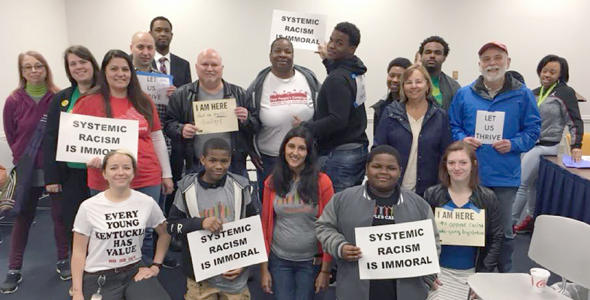Racial Justice

KFTC is working for a day when discrimination is wiped out of our laws, habits, and hearts.
Take action to protect ORSANCO and support water justice!
Last year a proposal came forward to do away with the Ohio River Valley Water Sanitation Commission (ORSANCO) regulatory mission.
A Racial Justice Guide to Thanksgiving for Educators and Families
Please visit this great list compiled by Border Crossers that is A Racial Justice Guide to Thanksgiving for Educators and Families that has lots of great resources for a wide range of entry levels.
Cultural Appropriation: resources for the holiday season
As the holiday season progresses from Halloween to Thanksgiving to holidays celebrated by many people during Winter Break, the KFTC Racial Justice Committee had the opportunity to pause and have a conversation about the cultural appropriation that is so pervasive during these months.
"Dressing up" for Halloween
Madison County member Wendy Warren writes about ways educators can do better when teaching about Native peoples. This article also address cultural appropriation at Halloween.
"As I thought about the things I have learned that have convinced me that I would never again consider dressing a child in an "Indian costume" for Halloween, I realized that there were probably many other things I have done in my teaching career that were equally embarrassing. Some of the first that come to mind are some of the "Indian art" activities I found in activity books that I used in an honest attempt to teach about Indian cultures. Now I know enough to understand that some of them were quite disrespectuful, in that they trivalized things that were quite important - even sacred- in some Indian cultures. But how can a non-Indian teacher come to know what things are sacred and what are not?"
Teaching the Truth Is Not Easy
This linked article is written by Madison County member Bobby Starnes about how the history of Native American's are taught in our schools and why we should, and can, do better.
"Teaching the truth is not easy. Maybe it raises too many questions about our national character. Maybe it depresses us to learn about historical injustices. Maybe it’s too raw for the squeamish or those who can feel proud to be American only if our nation is pure and perfect. So, okay, if you can’t, don’t teach the truth. Let it sit silently on the bookshelves and in other safe places. Don’t talk about it. Let it go unsaid. I don’t like it, and I don’t think it’s a good idea, but I do understand it.
But here’s what I don’t understand — really, sincerely, I don’t understand. Why do we feel compelled to teach the lies?"
Page
KFTC's Racial Justice Committee
KFTC's Racial Justice Committee helps ensure the organization is incorporating racial justice and anti-oppression into all of our work and strategies. The Racial Justice Committee’s work includes informing the membership on issues affecting racial justice, coordinating education and skill-building opportunities, and ensuring that racial justice principles are applied to all areas of KFTC’s program of work in an intersectional way. The Committee helps ensure KFTC is being a good ally and is working in solidarity with other organizations on these issues.
Where we stand
KFTC's Statement on Black Lives Matter - Why 'Black Lives Matter' matters
KFTC's Statement on Immigrants, Refugees, and Muslims
Resources
KFTC is launching a political education curriculum in 2021 where we will learn from abolitionist perspectives about defunding the police and moving toward our vision for ALL people to enjoy a better quality of life. Sign up to stay informed on when this curriculum will launch at cutt.ly/PoliEdSeries
VIDEOS
Unvictimizable: Fatphobia and Ableism as Weapons of Antiblack Violence with Professor Anna Mollow (32 minute video)
Lydia Brown on Disability Justice Intersection with Racial Justice and Queer/Trans Liberation (40 minute video)
ARTICLES
1619 Project – New York Times Magazine
400 years ago, in August 1619, a ship landed at a British colony in what is now Virginia carrying more than 20 enslaved Africans, who were sold to the colonists. 250 years of slavery followed. On the 400th anniversary of the start of slavery in the U.S. the New York Times tries to truthfully tell the story of what happened then, and since.
Journal of Environmental Sociology on Intersections of disability justice, racial justice, and environmental justice (a bit academic, but very relevant)
Trump's Rule Attacking Disabled and Low-Income Migrants Has Violent History (Truth Out opinion piece)
A US Immigration Policy History of White Supremacy and Ableism (Aljazeera opinion piece)
Jim Crow’s Disabilities: Racial Injury, Immobility, and the Terrible Handicap in the Literature of James Weldon Johnson (Project Muse)
OTHER
Book recommendations from Organizing White Men for Collective Liberation
Fighting for Social Justice: The Power of Women of Color (a short timeline)
- Home
- |
- Sitemap
- |
- Get Involved
- |
- Privacy Policy
- |
- Press
- |
- About
- |
- Bill Tracker
- |
- Contact
- |
- Links
- |
- RSS


